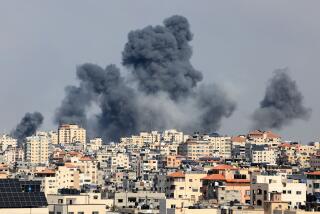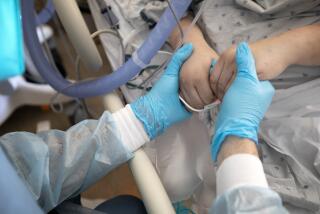Analysis of Terror Risk Offers Reassurance, Warning
- Share via
SACRAMENTO — The odds are relatively low that California will suffer a catastrophic attack on its electricity grid, transportation systems, water supply or oil and gas facilities, a terrorism expert said Thursday.
But the events of Sept. 11 raise the prospect of entirely new vulnerabilities and should nudge the state to launch an intensive study of previously unanticipated threats, said Jack Riley, director of Rand Corp.’s criminal justice unit.
He was among a dozen witnesses testifying at a Capitol hearing held to gauge California’s ability to cope with a major terrorist assault and respond effectively.
Others included a UCLA public health expert who warned that a bioterrorism attack infecting people throughout the state could overwhelm California hospitals and laboratories, creating “a very dark scenario.”
In Los Angeles County, in particular, “the [health care] system runs pretty close to capacity all the time,” said Dr. Steven Rottman, director of UCLA’s Center for Public Health and Disasters. “If you add to that any other wrinkle, you’re in trouble.”
The hearing was convened by the Little Hoover Commission, a bipartisan watchdog agency that will send a report and recommendations to the governor and Legislature in January.
During a day of testimony, the commission asked officials from health care, law enforcement and other fields for a portrait of California’s readiness to withstand terrorist attacks.
Some of the most alarming comments came from Rottman, who said the state’s health care system is so stressed by financial problems, a nursing shortage and other factors that any added burden could leave thousands untreated.
To cope with an epidemic of smallpox, anthrax, botulism or some obscure virus, Rottman said, health officials might be forced to establish emergency facilities to handle all cases of communicable diseases. That, however, would solve only one part of the problem.
Even if “. . . you have beds, you don’t have people to staff them,” Rottman said. Likewise, “You’d have tests [to detect infection], but you don’t have labs to run them.”
Rottman offered several suggestions for enhancing readiness, among them a sort of National Guard for medical personnel: a “registry of physicians with skills useful in a disaster.”
“We could sort of prepackage these specialists who could be packed off to a certain region of the state” as needed, Rottman said. Commissioners praised that idea, and said they would pursue it with the state Department of Health Services.
Rand expert Riley opened his testimony with a relatively upbeat assessment of the state’s vulnerability to “conventional” terrorist attacks on its most vital infrastructure: dams, power lines and plants, public transit, oil refineries and so on.
Riley said that with the exception of subway systems in Europe, such targets historically have not been “sexy” for terrorists, in part because they are often in remote areas.
In addition, he said, dams are engineered to withstand the explosions typically associated with terrorists--though perhaps not a blow delivered by a hijacked airplane.
An attack on the power grid, Riley said, would be unlikely to cause long-lasting effects. As for the water supply, he called it the public’s No. 1 concern, but said large-scale contamination would be hard to accomplish because of the vast amount of contaminants required.
“Even if there was a way to do that surreptitiously, if it’s a biological agent, the water treatment in most metropolitan areas would take care of that,” Riley said. “I feel confident about the water supply. I feel confident drinking the water that comes to the house.”
Riley’s optimism drew criticism from one commissioner, Stanley Zax, who told him he was “troubled by your general sense of confidence.”
That prompted Riley to add that the Sept. 11 attacks have raised the specter of new threats that analysts at Rand and elsewhere have not had time to evaluate.
“This is the first terrorist attack that has disrupted the broad social fabric,” Riley said. “It really raised the stakes, and requires a new study of our vulnerabilities.”
The commissioners agreed, noting that the state’s analysis ought to be conducted on an ongoing basis to track new threats as they emerge.
Also testifying was Atty. Gen. Bill Lockyer, who said the state Anti-Terrorist Center created last month is sifting through thousands of tips in coordination with local law enforcement.
In addition, computer experts in Lockyer’s office are joining federal agents in investigating a series of sophisticated cyberattacks over a three-month period leading up to Sept. 11.
Lockyer said the attacks targeted 140 computer sites at universities, businesses and government offices in 21 countries and aimed to disrupt systems or steal money. They appear to have been launched from New York or Yugoslavia.
“They were so sophisticated that it appears to have not been the usual mischief of hackers,” Lockyer said. The activity stopped Sept. 10, and though there is no evidence of a link to the hijacker attacks, “the worry and fear is that there might have been some widespread computer attack contemplated.”
In addition, the attorney general said he advocates a national identification card for travelers--an idea put forth by a federal task force but attacked by privacy advocates--and will recommend legislation to enhance police wiretapping authority in California, a move in line with measures approved by Congress.
More to Read
Sign up for Essential California
The most important California stories and recommendations in your inbox every morning.
You may occasionally receive promotional content from the Los Angeles Times.













